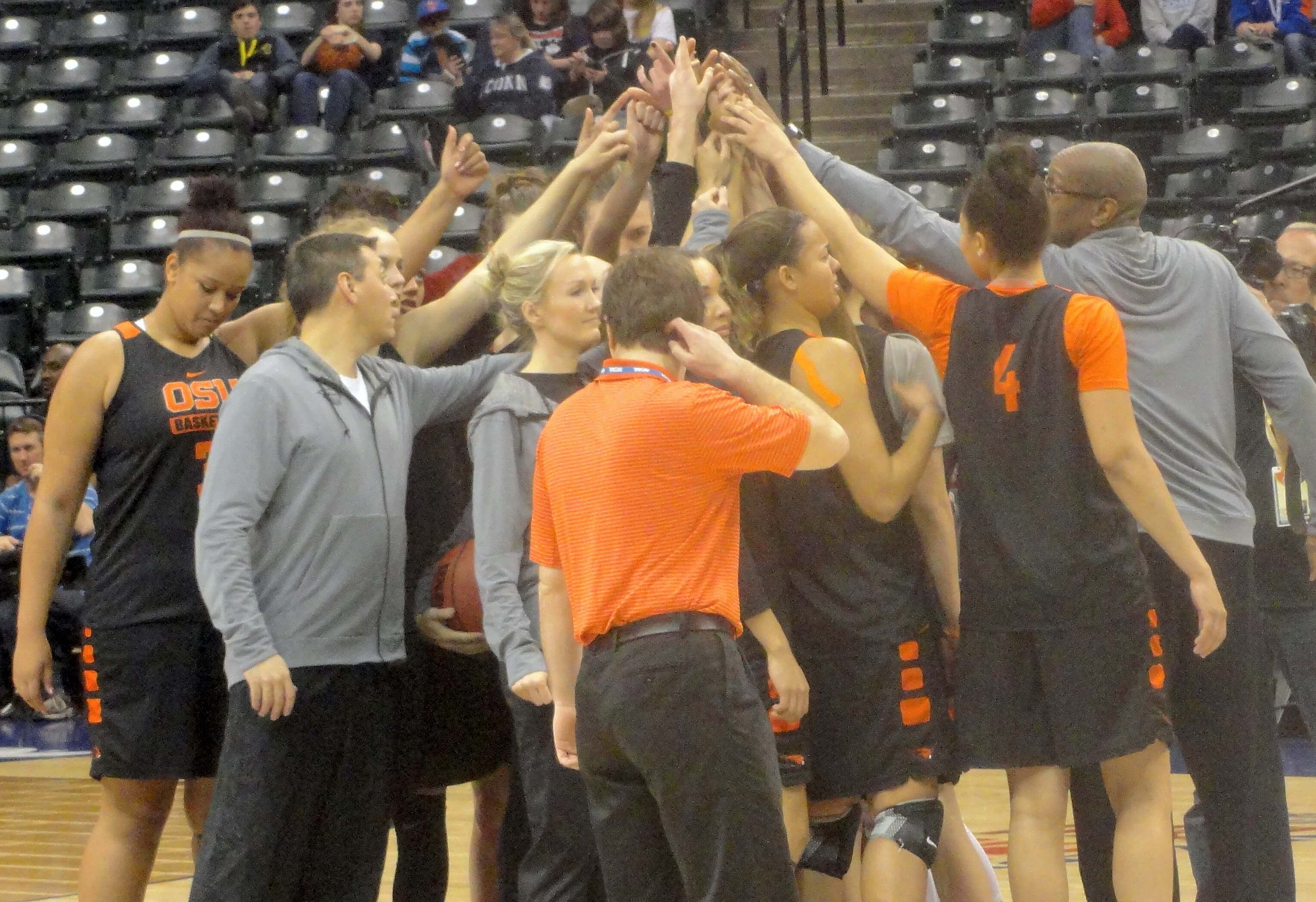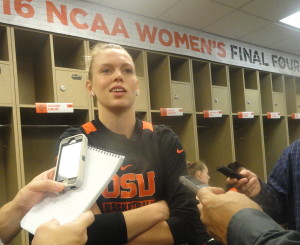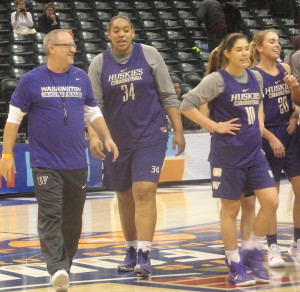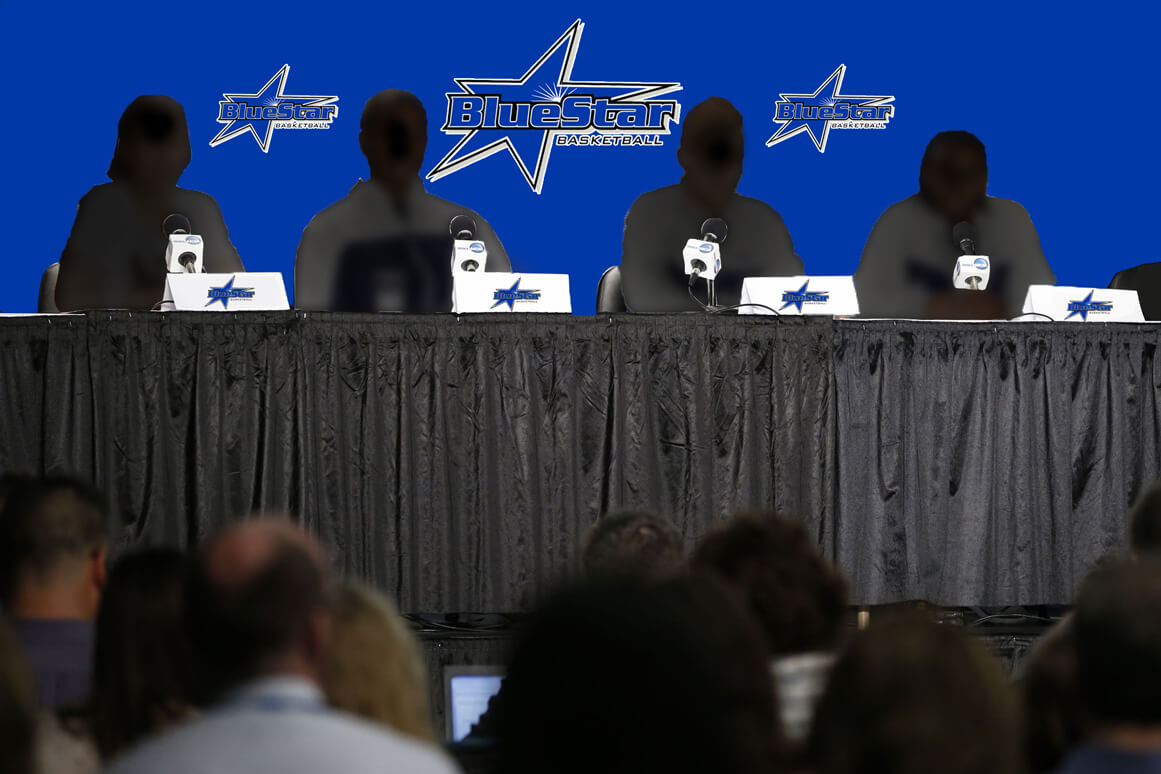
INDIANAPOLIS—Jamie Weisner had no good reason to hear out to first-year Oregon State coach Scott Rueck when he made his first recruiting visit to her home on Valentine’s Day, 2011, when she was a junior in high school.
Most of the other Pac 12 schools were already interested in the fine-shooting guard with plenty of swagger. So where some local schools near her home in Clarkston, Wash., and a few more in the Midwest.
Oregon State was mired in the depths of the Pac 12. After inheriting two scholarship players following a wave of defections and the firing of his predecessor, Rueck held tryouts to fill a roster, adding soccer and volleyball players to get to 11.
The Beavers were in the midst of what would become a 9-21 season, with only two wins in conference play.
Yet Weisner not only listened to Rueck, she followed him to Corvallis.
“It wasn’t about wins and losses,” Weisner said Saturday. “It was about the people. He told me he was going to bring the right people in for us to win.

Oregon State’s Jamie Weisner.
“That was it. He pitched people to me, that he cared about me as a person as much as a basketball player, and that we were going to have the right people here.”
To make a sales pitch like that, off a dreadful season following a dreadful series of events, seems totally implausible.
For that vision to have paid off has been nothing short of miraculous. Oregon State makes its Women’s Final Four debut Sunday against Connecticut (6 p.m. ET, ESPN).
The Beavers (32-4) are one of three first-time programs to reach the Women’s Final Four, along with Syracuse (29-7) and Washington (26-10), who will play in the nightcap.
UConn (36-0) is heavily favored to win an unprecedented fourth consecutive NCAA title and send off senior All-Americans Breanna Stewart, Moriah Jefferson and Morgan Tuck into the history books.
But the arrival of Oregon State, Syracuse and Washington symbolizes revived hopes in women’s college basketball of some serious, lasting competitive balance, ideally in the near future.
It’s a notion that’s been shattered for most of the last 25 years, when UConn was the surprising debutante at the Women’s Final Four, and has alternated NCAA title runs with Tennessee.
Only Baylor (twice), Maryland, Notre Dame, Purdue and Texas A & M have interrupted that domination since the Huskies’ first title in 1995.
“Do I miss those days? Sometimes,” UConn coach Geno Auriemma said. “I don’t miss coming to the Final Four in 1991 and having Tennessee, Stanford and Virginia and people look at us going: ‘What are you doing here?’ I don’t miss those days. And I don’t miss the days when I didn’t have Stewy, Moriah and Tuck, not at all.”
Oregon State’s breakthrough is perhaps the most improbable of all.
Rueck coached an NCAA Division III national championship team at George Fox University in Newberg, Ore., in 2009, then left a year later for his Oregon State, his alma mater, whose women’s basketball program was a disaster.
“Utter chaos, that was the feeling,” Rueck said. “And it was one of the most rewarding years of my life, taking a group that had zero chance and finding a way to make them competitive nearly every night. So we were in all but three, three or four, three games, I believe, that year. That team is a remarkable story.”
What others may have seen as misery, Rueck used to build a program that has made a habit out of defying long odds and doubters.
He recruited the current stars, including Weisner, the Pac 12 player of the year, and defensive player of the year Ruth Hamblin, off that first season.
Since then, the “people” that Rueck promised have continued to pour in. Point guard Sydney Wiese, now a junior, signed on from Arizona.
This season, a veteran Oregon State team shared its first Pac 12 title with Arizona State, and won the conference tournament for the first time.
Pegged as a No, 2 in the Dallas regional, the Beavers held off top seed Baylor in front of a hostile crowd in the Elite Eight.
“We weren’t rattled,” Weisner said. “We were playing for each other. We’ve exceeded a lot of people’s expectations, and it’s been an amazing journey.”

Mike Neighbors got Kelsey Plum (10) to keep her word to come to Washington.
Washington coach Mike Neighbors had a sizable selling job of his own in 2013, when then-Huskies head coach Kevin McGuff left for Ohio State. Neighbors had been his assistant at Washington, just as he was for McGuff at Xavier.
Together they had recruited Kelsey Plum, a top-flight guard from San Diego, who had verballed to Washington. With McGuff gone, Plum re-opened her recruitment, but sent Neighbors a text message: “You stay, I stay.”
Her decision to stay has been described this week as a leap of faith. Neighbors inherited a Washington program that had been on an NCAA tournament drought dating back to 2007. Now he had the cornerstone to change that.
“I just thought the pieces were right, the teammates were perfect, the system was great, and I love the city of Seattle,” Plum said Saturday. “So it was a leap of faith.”
Her junior season isn’t quite complete, and already she is Washington’s career scoring leader with 2,401 points, and is fifth in Pac 12 history.
The Huskies finished fifth in the Pac 12 and got a No. 7 seed. Along the way they upset the No. 2 seed Maryland and No. 3 seed Kentucky on their home floors.
Neighbors, who also is a former assistant at Arkansas, Tulsa and Colorado, is their unflappable leader.
A high school coach and teacher in his native Arkansas, he wasn’t even 30 years old when he had the first of two heart attacks.
“It was an eye-opening moment that your life’s really, really short,” he said. “I started to take some inventory of things I had been doing those first 29 years.”
Among them included improving his reading speed from 40 words a minute. These days, he roars through books, and a weekly newsletter he sends out to a mailing list of more than 2,000 coaches includes not only coaching tips, but ideas he’s picked up from his reading.
He’s also a movie buff, and likens his current team to “The Little Giants,” starring Rick Moranis, Ed O’Neill and John Madden.
“It’s got that one-time speech in the locker room, if you haven’t seen it,” Neighbors said. “It’s a really underrated inspirational movie.”
Syracuse’s upset of No. 1 seed South Carolina was triggered by its aggressive, hustling guard play and the leader of that improbable pack has had to overcome being underestimated.
Senior Alexis Peterson starred in high school in Columbus, Ohio, but wasn’t recruited by the Buckeyes. Instead she went to Syracuse, where Quentin Hillsman was quietly putting together a program that has been sliding under the national radar.
In his 10th season, Hillsman has coached five NCAA teams at a school with little previous success.
This season, the Orange reached the ACC title game before losing to Notre Dame, then scored one of the biggest upsets of the NCAA tourney, knocking off No. 1 seed South Carolina in the Sioux Falls regional.
Peterson led the way in that game and scored 29 in Syracuse’s Elite 8 win over Tennessee to net the school’s first Women’s Final Four berth.
“Being expected not to win is something that our team has embraced,” she said.
She said an 11-game winning streak by the Orange after back-to-back losses to Louisville and Notre Dame in the middle of the ACC schedule was the pivotal point in the season.
“That taught us a lot about how to fight,” Peterson said.
Another key figure in the rise of Syracuse is redshirt junior guard Brittney Sykes. She’s recovered from two ACL injuries during her college career and as much as any of her teammates, embodies a fearless approach to the game.
“Any team that gets to the Final Four for the first time, that’s an upstart,” she said.
“We expected to be here. A lot of people did not, but that doesn’t matter now.”
Sykes said the real testament to what’s happened at Syracuse will be how the program continues over the next few years.
The same can be said of Oregon State and Washington.
UConn was among the many schools reaching the Women’s Final Four for the first time in the early 1990s. Most of the others have not been heard from again.
The Huskies will be making their 17th appearance on the final weekend of the season, a staggering number that most other teams can’t comprehend. Especially those savoring the experience for the first time.
“The trick in coming here is to make it feel like it’s the first time all the time,” Auriemma said. “And sometimes that’s hard to do because everybody just expects you to treat it like it’s the same old thing.”
Wendy Parker is a sportswriter and web editor who has covered women's basketball since the early 1990s. She is a correspondent for Basketball Times and formerly covered women's and college sports, soccer and the Olympics at The Atlanta Journal-Constitution. She is the author of "Beyond Title IX: The Cultural Laments of Women's Sports," available on Amazon, and the creator of Sports Biblio, a blog about sports books and history.




